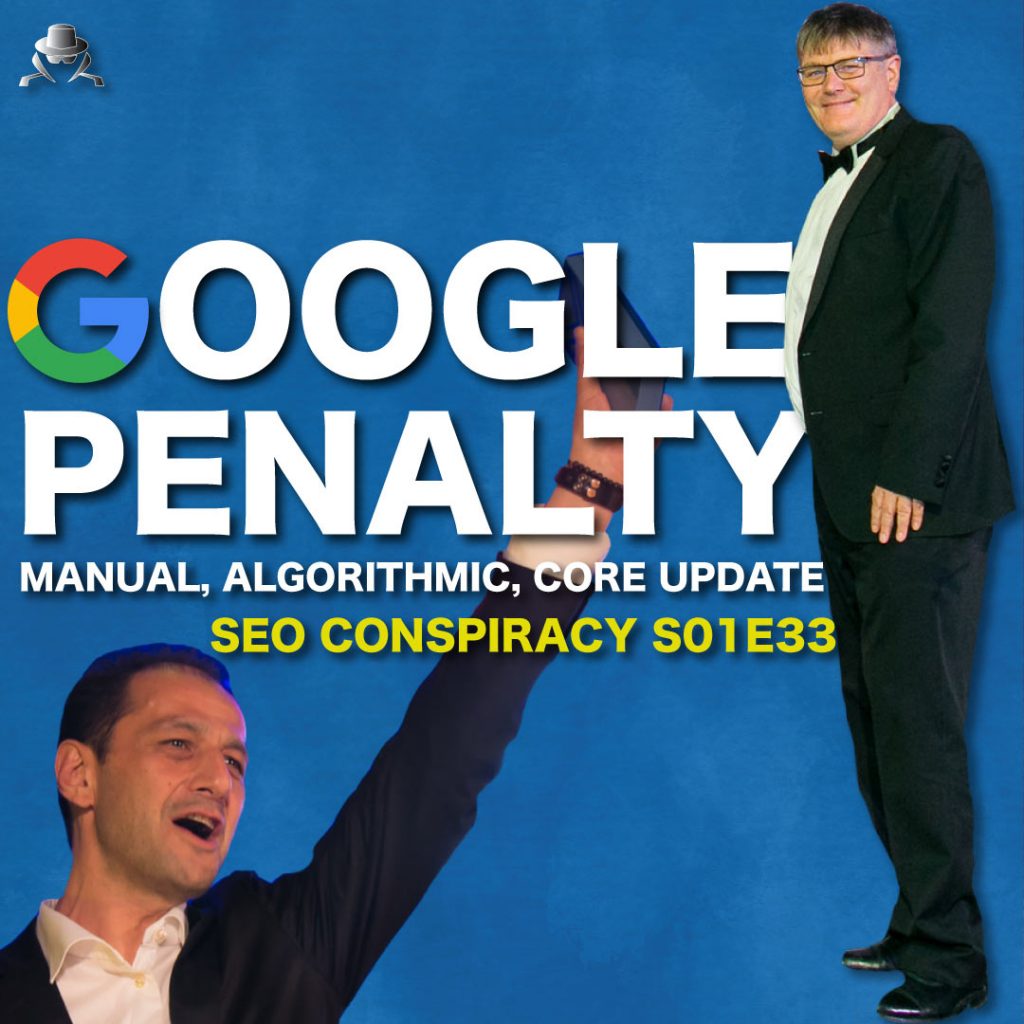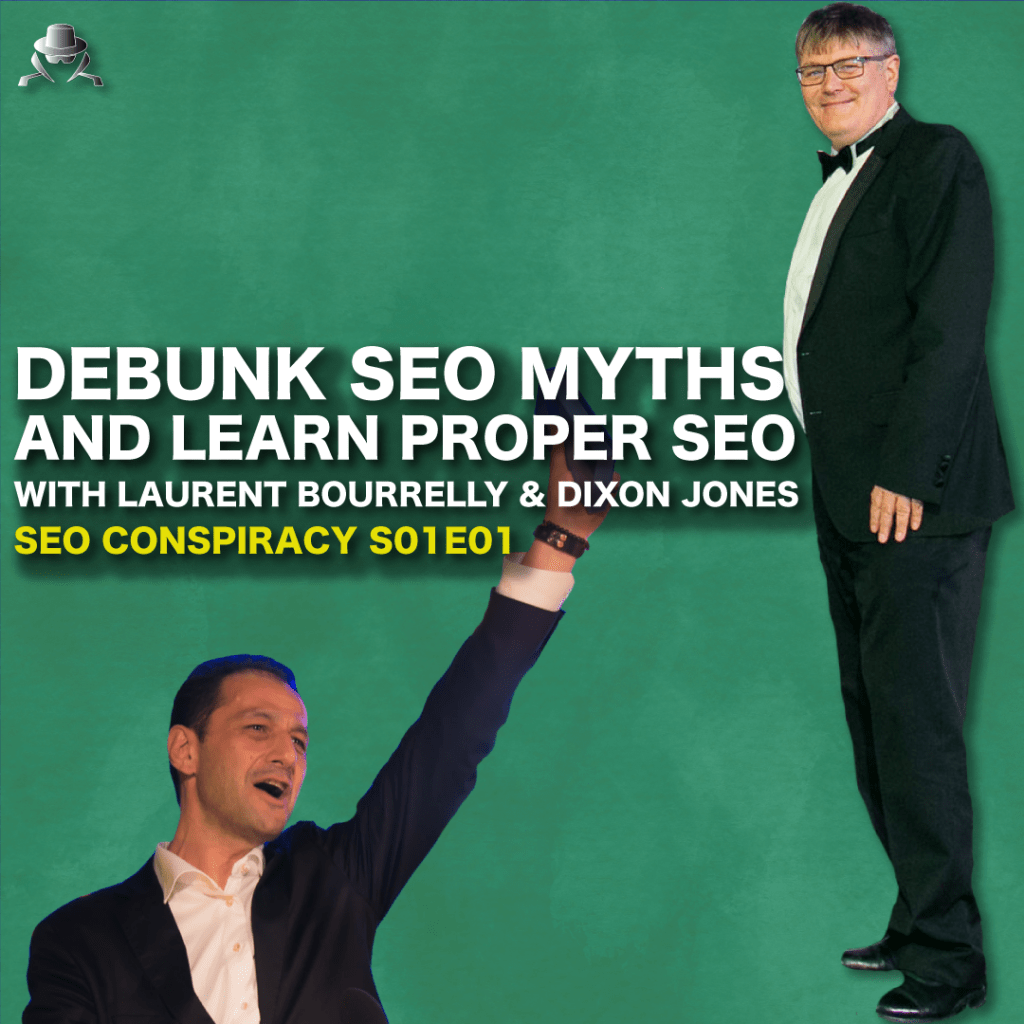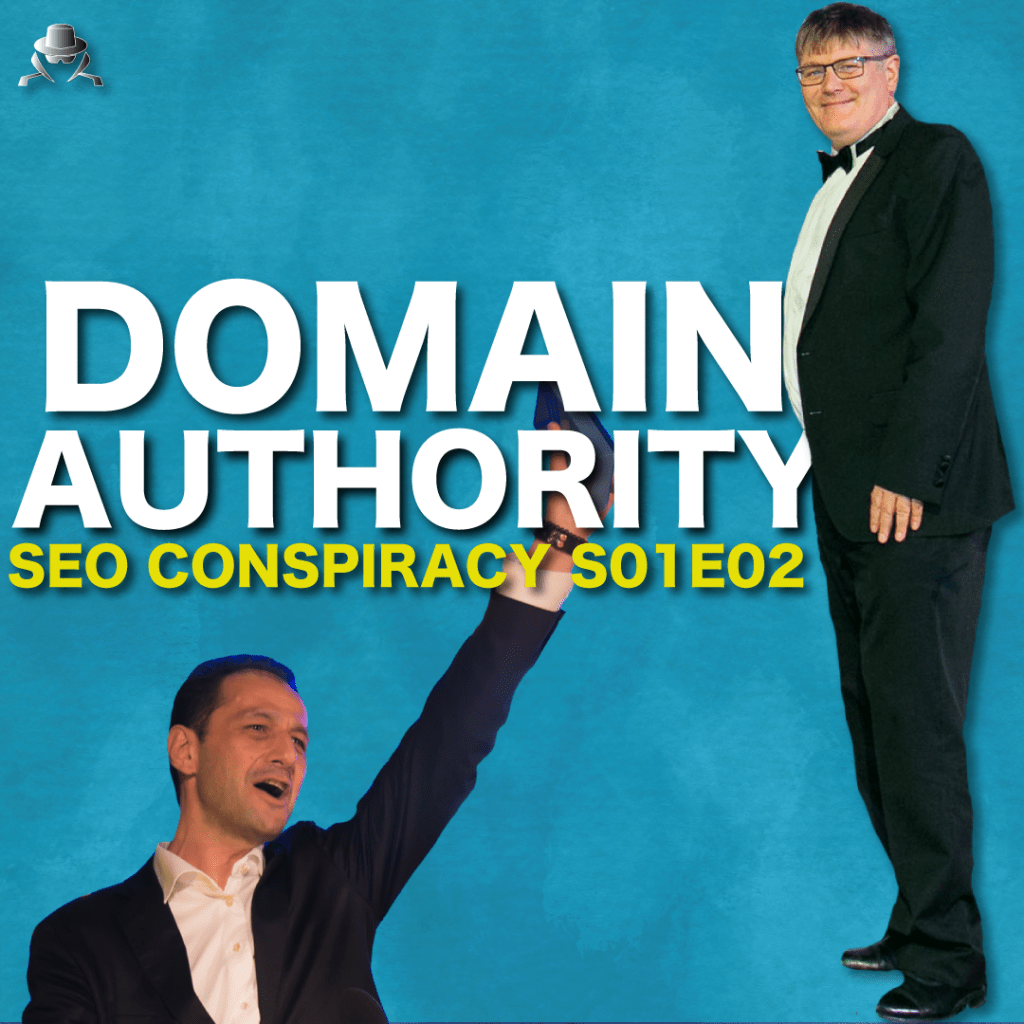Manual, algorithmic filter, core update? Your ranking dropped, but do you know why?
Google Penalties topic is when SEOs fall into the conspiracy trap so much, like: “Oh, my rankings dropped. Google must have conspired against me”. It’s the epidemy of paranoia in SEO.
Whenever your rankings drop, to assume that you’ve been penalized is not the first place that you should be looking for.
There’s also “if I’m not penalized, I got negative SEO, someone is attacking me, it’s somebody else’s fault. My site was clean, it’s nothing to do with me”.
Several different things could be happening here. Firstly, your site may be crap, and you may not have any audience anymore. Your best customers may have taken out 80 percent of your traffic, and you don’t see them anymore. I don’t know.
So it could be an algorithm change. That is the most likely thing. It’s not likely to be a penalty, that is likely to be an algorithm change.
Moreover, even if the algorithm didn’t change, you could be penalized either by the algorithm or manually penalized in very rare circumstances. So, you know, and I think that we get paranoid very, very quickly. And as SEO, we blame somebody else straight away.
When is it clear that you’ve got a penalty?
The easiest, most precise way is when you get the message in the search console.
It is something that Google never used to be able to do. So I think that Google now being able to tell you you’ve got a penalty is has made life quite a lot simpler. But I think it’s also entirely possible that you get a drop in rankings, not because you’ve got a penalty, but because a site that links to you has got a penalty.
It’s easier like getting a penalty because a website linked to you is penalized from a Google perspective. They need to be 100 percent sure.
My point is that you could drop your rankings of somebody else getting penalized. And so you’ve done nothing wrong. Someone else has got penalized, and they could be a big site. So these things can have an immense impact, and you’re going to feel that it’s a penalty on you, but you may not have been responsible for it.
Yeah, but I bet you you didn’t know. You didn’t think you were telling people the best negative or strategy, which is you build the most robust link you can to the website, to a website, and then you cut it, and you’re going to write. They won’t recover; it’s very damaging. If you lose like a significant, strong link, only one year to rebuild that link is worth so much more than all the other combined potentially.
Because when I understood wrong is the penalty is passing through the link. It’s not that. It’s just you’re missing link. What could happen is when, for example, U3 on a website that’s penalized to a new website, sometimes you flip of a coin, sometimes it doesn’t pass the penalties. Sometimes it does. It isn’t very easy. There’s no, no, no rules. But the exact cut way to SEO penalty. Yeah, you get a message in the search console. My advice, don’t do it halfway. The last time I depenalized the website had a manual penalty, it was for spam indexing.
The website had twenty-five million pages. I told them to drop 90 percent of your content, 90 percent of the pages. And not even three on one, not even four, four for ten, that’s not gone off, okay? I had nothing to see there, and they had the guts to do it because it takes guts to get rid of 90 percent of your content. Well, it’s less than seven days later they were back because you remove 90 percent of the content.
You did remove 10 percent or 50 percent, do a resubmit thing and then get back. Now, that’s going to last month and month or years or never.
You get that for spam indexing. For shady links, you have to get rid of the links for real. If you’re just filling-up the disavow file; it won’t work. The disavow file only works for a manual penalty, not if you have shady links pointing to you, not if you get hit by an algorithm, but an algorithmic penalty.
Moreover, even though it doesn’t work and remove the links for real if you have some good shows, that would.
I know both shows on both sides of the argument that argue flatly that, you know, disavow file does or doesn’t have the ability to, you know, modulate your rankings. So and I’ve not got enough experience with this about files to know for sure. I do know that when I’ve had a manual penalty for for for things that yeah, you’re right. If you don’t do the job properly, you know, then every time you end up trying to go back and get it done, they’re going to look harder and harder and harder. And they know you wait longer and longer before they’ll consider it again.
So let’s sit there and say you’ve given you a flag. You come back 48 hours later; you’ve got rid of 90 percent of content, then fine, I’ll let you back in a few days.
But if you don’t and you’ve come back, and you’ve wasted somebody’s time at Google checking over that, because when you resubmit or request you know, to ask a re-inclusion, there’s a human being that there’s a human being. That’s what you’re doing. And they’ve got this set of tools. A long, long time ago, I remembered Matt Cutts sitting in PubCon in Las Vegas on a site clinic. And he had his tools, other things that people were given, giving their sites up. And it’s like, oh, no, my house clean as the day is long. And then I went back out saying, well, all these links from I want porn, you know, whatever. Oh, yeah. But I’ve seen him do that.
I’ve seen him. He was, he was okay. My website got penalized. It’s not fair. Yeah. Okay, what’s the URL?
Well, what about do you think it’s proper to have one hundred and twenty-seven websites during their work on linking to each other. I started in 2003 in the summer as I said, I started wearing that black hat, and I made I think I was 12 sites. Yeah, just when I knew what to do back then, they were not very good, and I got hit by that first, like, Florida thing in November 2003. So first hand, I started with Google Penalties in 2003. That was part of my business model. I knew they had to deal with that. And I saw pretty much every kind since then.
The algorithmic ones, Panda, Penguin, was more like a psychological war. They won the impact. The psychological effects of Panda and Penguin were way stronger than the actual impact. That’s the first time they touched that regular website, nunation website massively. And that was a wake-up call. So no point talking about before then. What’s left of Bonda. Yeah, deafly. They leveled up to about how to analyze the quality of content, whatever that means. Then about Linc’s Penguin, what’s left of Penguin? Not that much. Pretty much. If you take care of not being too pushy with the text and meaning, no, it’s easy. Okay, you got a keyword on the Internet link, then you got the same eye contact with the same keyword on the backlink. Well, then if it’s, how do they know it’s commercial.
Well, they got tools, and well, they do because they’ve got a topic, and they can analyze whether it’s a brand, you know, and treat that as an entity in its own right.
So be careful with the links with the volume of ling, with the frequency. You got to go soft on the frequency, and you get to be cautious with the anchor text. You can do it again. But there’s not much left of Penguin because they got too many issues with it. Is that one hundred percent? Are you sure that the website owner billed those shady links, or it just happened, and there were too many cases of sites getting hit, but it was not? It could have been negative and negative SEO was working very well. And the best way to do it, you were buying like some like ten dollars a month linking from India or somewhere. And they were making some comments. They were doing Web profiles and full well.
And you do. But you could all see also push the website.
But at one point, they would get hit by a manual penalty because there were just spam comments. So they had to reverse back to the way it was before.
Meaning if a link is not doing any good, it’s not doing any harm. Kind of swapping is dangerous. The trick is you don’t exchange links at the same time. You put six weeks between the back and forth, and it’s okay. It seems natural to you. Sometimes afterward, you lean back to me, that’s legit if you do it simultaneously, that could pop up some trigger, some red flag, the toughest penalties are also.
Yeah, important. I get a lot of calls right now. You’re going to watch this video a little bit later. But there was recently a court date, so ranking signals were supposedly modified. I think there was just realigned. Not really. It’s not an evolution. And a lot of people got dropped. Yeah, but the rest of Google doesn’t stop because there’s a code update. You could get a drop for many other reasons, and some of them are self negative.
Did you Negative SEO yourselves?
So you have like a problem, a technical issue…
You do a wrong canonical, you upload a disallow in the robots.txt, whatever it is, and you go to drop yourself. Just a date coincides when Google says, oh, this is an update; it’s not. You dropped yourself.
You did it all by yourself. I think as well in when it comes to penalties and algorithms and stuff, mainly when it’s okay, you’re right. You’re a penalty. When when you’re told in Google Webmaster Tools is the only time you know that it’s a manual penalty. And of that, except I know that Google says that people can do manual penalties and don’t go and tell the website owner. But it’s pretty rare. And I think that if you think that that’s happened to you, you’re probably wrong. And you’re probably thinking about search engines work incorrectly because you’ve got to remember that engineers don’t like wasting time trying to deal with the spam stuff. It’s a waste of their time and their energies. They want to make them think they want to assume that everybody in the world is good and that they’re going to make a better search engine based on random lots of information, and they can do a better job for it. So they’re thinking about trillions of URLs, you know, hundreds of billions of events, a myriad of different content types and indexes. And they’re trying to blend all this stuff in. They’re trying to think about it from the user. To give a page that’s good enough for the user. They don’t care what page comes back, as long as it’s one that’s good enough for the user. So we get upset when our rankings go down. We get annoyed, we get angry. I’ve seen people crying at conferences because I feel that Google’s been evil to them, and it’s just a mathematical algorithm. And if you built your business so that you only get organic traffic from Google, you have done business.
Yeah, I call that the traffic in three parts authority, which means direct traffic. One third is from search, and one third is from referrals. And if you got the pie sliced in three, you’re right.
The hidden manual penalty.
That’s a hard one, but it’s very rare. For over fifteen years, I’ve seen it only once.
So every day, you know, and I think it’s when Google pretty much wants to be mean. At that point, I think you’ve probably really have gone way. You deserve it. Yeah. No, no. That’s when you, you know, so you probably have broken the law. I think one of the things that Google has done that are good is the reverse of that is now, you know, if they see that you’ve got excess vulnerabilities on your site, you’ve got your site appears to have been hacked, or you seem to have some weird things going on, then they will help you out. And what they’re doing is they’re minimizing the blackout spam by telling you about the stuff that you’ve got wrong because you didn’t realize you’ve got, you know, leaks all over your site when somebody comes, but you’re putting your visitors in danger.
That’s because that’s the bad hacking part. And Google did. Yeah, you’re right. The excellent job is trying to protect users from visiting dangerous websites. And sometimes they’re not dangerous because the owner is shady is.
Because somebody hacked yeah, no, yeah, and you might not know for years and years and years, it could be there, and you don’t know they’re the trickiest, the most difficult. And I don’t even know if we can call it a penalty is you got to the first one is what I call the Bermuda Triangle, is when your side is stuck between two algorithmic filters, and you see it going up and down. It’s behaving not just not a significant drop; it’s kind of it’s trapped in the matrix. It’s a bug, okay? That’s what’s called a bug.
And I’ve got a lot of rankings right now that are popping between ranking nine and 12. You know, it’s just seen it going like that.
But it’s going to resolve by itself. Just be patient. It’s going to come back the most. And even if you think you get hit by this court date thing, be patient. If you think you are legit, you will come back. Don’t start freaking out. Be patient a little bit. The trickest one, the hardest of them all, is the loss of authority or legitimacy.
Day by day, week by week, your traffic or your ranking is dropping, little, little by little. If you don’t do anything, it’s not going to stop, and you are number one. You are good. But Google is testing you is saying for whatever reason, I don’t think you are that much of authority anymore, and it’s going to drop you a little by little.
It’s not an official penalty. It’s something I’ve, and to recover from that, you get to send strong signals, rebuild the site, do semantic SEO. We are a specialist in that. That’s the way to do it. Show some love to your website.
To recover from that, you got to show some love. You got to prove you are worth it to you know; if you regain the love from Google, if you offer enough love to your website and Google says, yeah, okay, you’re right, then you’ve got to come back more powerful.
But it’s not a Pepsi. It’s people now have better, fresher. Yes. More relevant content. The new, you know, time. Some people say that you know, having a page it’s been there for a long time is right for SEO. I think, you know, it’s not necessarily if it doesn’t stay fresh and meaningful and Google knows because, you know, if it’s new mean, it continues to get links. You may be updating each year. That is quite a smart way of keeping it fresh and stuff. But if it’s just going to sit there, it’s going to become old. It’s not going there.
Intense change. The other ones are moving ahead. The other ones are doing stuff. And you’re not moving. Not doing anything is the worst enemy of a nothing, doing nothing. Okay, if you do something and do not do anything, it is the best way to rot slowly.
Listen to the podcast
Watch the video



